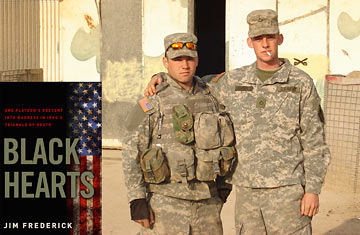
Private First Class Steven Green and fellow soldier Chris Barnes appear in Iraq
(2 of 2)
After three loved and respected leaders from 1st Platoon — First Lieutenant Ben Britt, Staff Sergeant Travis Nelson and Sergeant Kenith Casica — were killed in a two-week period in late December 2005, the unit went into a tailspin of poor discipline, substance abuse and brutality. Green, however, was more noticeably and disturbingly affected than anyone else ...
While many men within 1st Platoon were having trouble adjusting to the casualties the unit incurred, the incessant pace of combat operations and the constant threat of violence, Private First Class Steven Green was reacting particularly badly. The day Nelson and Casica died, he had snapped. That was the when he gave up even pretending to support any notion of peace-keeping, society-building, or being nice to Iraqis. From then on out, all he cared about was killing them.
This was well known, and not something he attempted to hide, even from senior leaders. Many of the men by this point hated Iraqis and would offhandedly opine that the whole country needed to be leveled, or the only good Iraqi was a dead Iraqi. But only Green talked about killing Iraqis all the time, incessantly, obsessively.
At the prodding of his platoon sergeant, Green went to see Lieutenant Colonel Karen Marrs, a psychiatric nurse practitioner from the Combat Stress team who was visiting Bravo Company's base on December 21. The intake evaluation form she filled out while talking to him that day is a horror show of ailments and dysfunctions. In the entry marked "Chief Complaint," she quoted him: "It is f — ing pointless." Green told Marrs he had been suffering from symptoms of instability, extreme moods and angry outbursts, including punching walls. He told her he was experiencing all of the following: sadness, difficulty falling asleep, nightmares, anxiety, worry, increased heart rate, tightness of chest, shortness of breath, feelings of helplessness, being easily startled, being quick to anger and thoughts that he would not make it out of combat alive. Green told Marrs he was having suicidal and homicidal ideations, especially thoughts about killing Iraqi civilians. On his one-page intake sheet, Marrs noted his wanting to kill Iraqis four separate times. One entry states, "Interests: None other than killing Iraqis."
She diagnosed him with Combat Operational Stress Reaction (COSR), an Army term to describe typical and transient reactions to the stresses of warfare. COSR is not a condition recognized by the Diagnostic and Statistical Manual of Mental Disorders-IV, the bible of the psychiatry profession, something the Army is well aware of, since it doesn't even consider COSR an ailment. As one Army journal article puts it, "Those with COSR are not referred to as 'patients,' but are described as having 'normal reactions to an abnormal event.' " Thus Marrs, believing Green's psychological state to be normal, prescribed him a small course of Seroquel, an anti-psychotic drug that can also be used to treat insomnia, recommended that he follow up with another visit (though she didn't specify when), and sent him back to his unit.
"I told her, 'My main preoccupation in life is wanting to kill Iraqis,' " Green recalled. "She said, 'Okay, here's these pills that will help you sleep, and we'll probably be around.' I don't think she thought I was serious, even though I was going out of my way to be like, 'Look, I'm serious about this.' "
According to Green's Company Commander Captain John Goodwin, Marrs reported back to him that Green "needed a little bit more counseling." Goodwin, like most of Green's superiors, thought Green's problems were manageable anger issues that could be dealt with, he said, "through time, through grief counseling, if necessary, medication, through combat stress, and supervision."
When Staff Sergeant Bob Davis, a combat stress technician, arrived in January 2006 as part of the team to relieve Marrs' team, she told them about Green. "She warned us that, given his experiences and the things that he's done, he might be someone we'd want to follow up with," Davis remembered. Despite this warning, they would not see Green until March 20, 2006 — eight days after he had already murdered the Janabi family.
Reprinted from Black Hearts: One Platoon's Descent into Madness in Iraq's Triangle of Death. Copyright © 2010 by Jim Frederick. Published by Harmony Books, a division of Random House, Inc.
Tomorrow's excerpt: Anatomy of a war crime.
